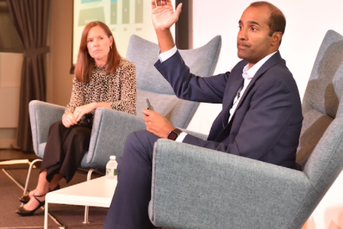Advisers need to address gender stereotypes about women: Merrill

The time for the industry to fully address the negative financial experiences of women is long overdue, according to a new study
The fight for gender equality is still an uphill battle in wealth management as advisers struggle with gender stereotypes and unconscious biases that hurt female clients, according to a comprehensive study published Wednesday by Merrill Lynch Wealth Management.
On average, a woman experiences 10 behavioral miscues for every 30-minute meeting with an adviser, according to the data. Miscues include if the female investor is holding her family’s financial paperwork, but the adviser speaks directly to the man.
After reviewing analysis that tracks eye movement, Merrill also found advisers focus 60% of their time on the man in meetings with a heterosexual couple.
Other frequent forms of biased behavior include viewing women as more risk averse, assuming women are less knowledgeable than men about investing and concluding a couple’s finances are merged or jointly invested.
[More: Nomination period for InvestmentNews’ Women to Watch closes Sept. 7]
Although only one in 10 women reports a negative experience with a financial adviser based on gender, women are also less likely to confront their adviser about it, according to Lindsay Hans, division executive at Merrill Lynch Wealth Management and chair of the executive D&I council.
“We have to look at that data and acknowledge that in many cases, for whatever reason, women in those situations are less likely to speak up,” Hans said. “We can’t, as an industry, only rely on this feedback — we have to get to the root of it, which is unconscious biases, and stop that experience from happening in the first place.”
Only 12% of women among the 4,000 investors surveyed confronted their adviser or filed a complaint after experiencing gender-based biases, compared with 18% of men. Just 3% of men reported having a negative experience with an adviser based on gender.
BREAKING BARRIERS
Advisers looking to make immediate improvements can start by checking and acknowledging situations when they may have exhibited their own unconscious bias in a meeting with prospects, Hans said.
“Advisers should think: ‘I better check myself to make sure I’m not falling into unconscious bias,’” Hans said. “Or advisers should think: ‘Maybe I need some feedback around unconscious bias and have a team member in a meeting check me on this and make sure that I’m not participating in these behaviors.’”
Merrill is taking action to break down barriers. Last year, more than 20,000 Merrill employees across the country participated in inclusion training sessions with a focus on understanding unconscious bias and cultivating inclusive environments, according to the firm.
The brokerage is also working to deliver training informed by this latest research to all new advisers joining the firm, along with additional training to existing advisers. In addition, Merrill is removing the “primary” designation from joint account enrollment in recognition of the equally important role both partners play in a financial relationship.
WOMEN’S EQUALITY
Merrill’s study was released on Women’s Equality Day, which commemorates the passage of the 19th Amendment, guaranteeing and protecting women’s constitutional right to vote.
However, it is critical for the industry — and the country — to acknowledge that while women were guaranteed the right to vote a century ago, women of color were not granted the same privilege until nearly five decades later, according to Democratic vice presidential nominee Kamala Harris, who expressed her thoughts via Twitter.
We cannot mark Women’s Equality Day without remembering the voters of color who weren't included in the 19th Amendment victory a century ago—women who faced poll taxes and literacy tests.
To honor their sacrifices, let's vote in record numbers this fall.https://t.co/WQjCmnEtNz
— Kamala Harris (@KamalaHarris) August 26, 2020
“We need to lead the industry to build on trust and take transparency to the next level, particularly when it comes to multicultural women,” Hans said.
The study’s release on Women’s Equality Day signals that advisers should reflect on their own actions to combat gender and racial inequality, she said. Moreover, advisers should increase transparency around diversity data while speaking up about situations that prove much more work needs to be done to achieve true equality.
“The No. 1 most important thing we can do is increase transparency,” Hans said, noting that was the driving factor behind Merrill’s being one of the only major wealth managers to release its adviser diversity data last week. “We knew regardless of the data and findings, we were going to release the results.”
Merrill Lynch has boosted its female adviser count to 3,650 of its 17,500 advisers, or 21%, and advisers who are ethnically diverse to 3,960, or 23%, the firm said. In 2015, those levels were at 18% and 15.5%, respectively.
“If we are transparent about unconscious bias and understanding female experiences in the industry, then change can happen,” Hans said. “The future is female and the future is now — but we still have a lot of work to do.”
Learn more about reprints and licensing for this article.








